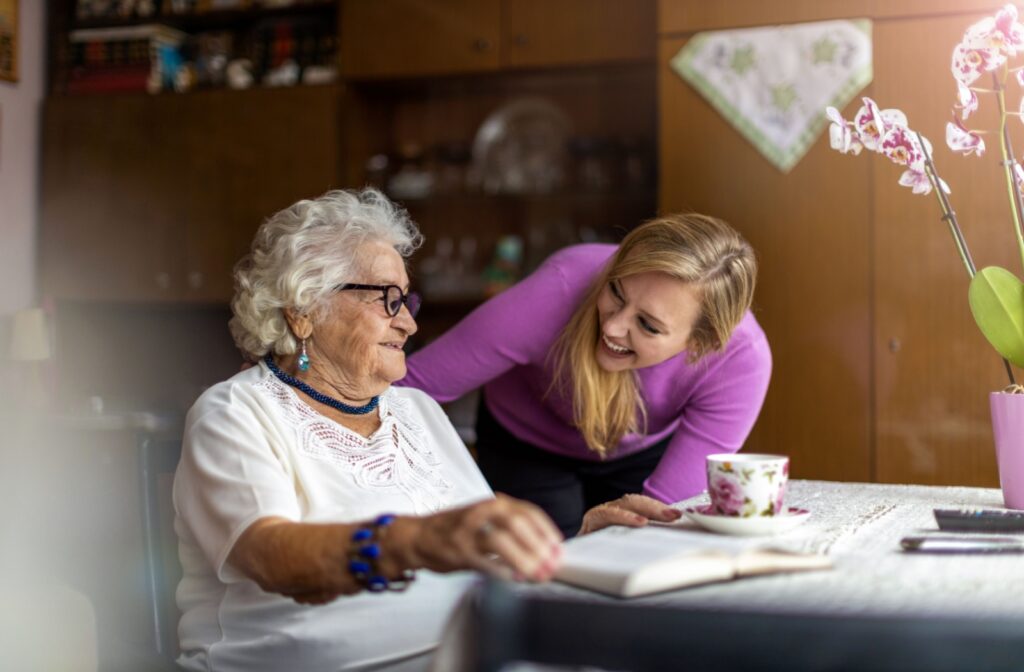Deciding when it’s time to consider assisted living is a significant decision. It’s not always an easy choice, but recognizing the signs can ensure your loved one receives the care and support they need to thrive.
Some signs that it’s time to consider assisted living include:
- Increased physical health concerns.
- Mental health issues and social withdrawal.
- Safety concerns or difficulty maintaining a home.
What Is Assisted Living?
Assisted living is a supportive housing option tailored for older adults who value their independence but need assistance with day-to-day activities. These communities go beyond traditional caregiving by fostering vibrant environments where residents receive personalized care.
Services often include help with daily routines such as medication management, bathing, dressing, and meal preparation, all within a safe and engaging community setting. Modern assisted living also offers everything from group activities and wellness programs to curated dining experiences, ensuring that seniors remain socially and mentally engaged while enjoying a sense of belonging.
Knowing when it’s time to make the transition to assisted living involves paying attention to your loved one’s physical health, emotional well-being, and living environment. So what signs should you be watching out for?
1. Physical Health Concerns
Your loved one’s physical health can provide clear signs that additional support might be necessary. While some changes are part of normal aging, others may signal a need for a more supportive care environment.
Frequent Falls or Injuries
Regular falls or difficulty with balance can significantly increase the risk of injury. Assisted living communities are equipped with safety features and round-the-clock support staff to minimize these risks.
Unmet Medical Needs
Missed doctor’s appointments, forgotten medications, or improper dosages can lead to serious health complications. Assisted living ensures proper oversight of medical routines, promoting better health outcomes.
Declining Mobility
Struggles with climbing stairs, moving around the house, or even completing basic tasks like getting dressed might indicate it’s time to consider a safer, more accessible living space.
2. Emotional & Mental Well-Being Struggles
Cognitive and emotional health are as vital as physical health for an older adult’s overall quality of life. Emotional struggles, even when subtle, can greatly impact your loved one’s happiness and sense of fulfillment.
Social Isolation
If your loved one is avoiding social interactions or has lost interest in hobbies they once enjoyed, this may signal feelings of loneliness or depression. Assisted living communities provide opportunities for social connection through daily activities, shared dining, and group outings.
Memory Issues
Difficulty keeping track of daily tasks, bills, or appointments may point to short-term memory issues. Even without a diagnosis of dementia, memory lapses can interfere with daily life.
Mood Changes
Persistent mood changes, such as lethargy, irritability, or sadness, can indicate deeper emotional challenges. Assisted living offers professional care in a nurturing environment to address these concerns.
3. Environmental Safety & Home Maintenance
Your loved one’s living environment offers important clues about their ability to manage daily responsibilities.
Cluttered or Unsafe Home
Unwashed dishes, piles of laundry, or general household neglect often signal they’re struggling to keep up with basic chores.
Safety Hazards
Signs like expired food, burnt pots, or missed utility payments suggest they may be unable to manage critical aspects of daily living.
Dietary Concerns
Skipped meals, noticeable weight loss, or reliance on unhealthy snacks could indicate difficulty shopping for groceries, cooking, or even remembering to eat.
Why Assisted Living Is a Better Choice

The idea of moving to assisted living may seem overwhelming at first, but this new chapter of a person’s life can bring profound benefits for both seniors and their families.
Enhanced Safety & Professional Care
Assisted living communities offer peace of mind. With a focus on safety features (like emergency call systems and fall prevention), your loved one will have immediate access to support if needed, removing significant risks and stress.
Social Connection & Engagement
Living alone can lead to isolation, which affects both mental and physical health. Assisted living fosters community through engaging activities, group events, and shared meals, helping build meaningful relationships and reigniting a sense of passion for life.
Tailored Independence
Assisted living provides just the right balance of support and autonomy. Residents can enjoy a low-stress routine, knowing help is available when needed, without sacrificing their sense of independence.
Peace of Mind for Families
Caring for an elderly loved one at home, while rewarding, can become emotionally and physically challenging. Assisted living allows families to focus on what matters most—spending quality time together rather than worrying about caregiving responsibilities.
Easing the Transition Into Assisted Living
The transition to assisted living can be a positive and exciting experience with the right preparation. Here’s how to make it easier for everyone involved:
- Start conversations early: Discuss assisted living openly with your loved one, focusing on the benefits it brings to their quality of life.
- Tour communities together: Visiting communities like Arbor Oaks Senior Living allows your loved one to get a sense of the environment, amenities, and people.
- Personalize the space: Help make your loved one’s new home feel familiar by bringing cherished items like photos, blankets, or favorite furniture. This creates a sense of comfort and belonging from day one.
Find Support at Arbor Oaks Senior Living
Deciding when to move into assisted living isn’t easy, but it can improve your loved one’s life. At Arbor Oaks Senior Living, we offer a warm, welcoming environment where seniors can thrive with professional care, safety, and enriching social activities. Call us today or schedule a tour to see how we can make a difference.


